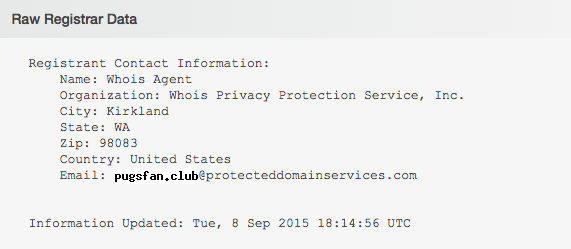Why you need privacy protection for your domain names
If you’re new to websites, you may be unfamiliar with some of the additional services that registrars offer when you purchase a domain. One service that can be especially confusing is domain privacy protection. What is it? And is it really necessary?

If you’re new to websites, you may be unfamiliar with some of the additional services that registrars offer when you purchase a domain. One service that can be especially confusing is domain privacy protection. What is it? And is it really necessary?
Remember all that personal information you submitted when you started to register your domain? Well all of that goes to the Whois directory—a place where anyone can look up a website and find information about who owns it, what hosting service they use, their address and phone number, and other pertinent facts.
That’s right: All your personal information can end up right on the web for anyone to see.
But with domain privacy protection, that personal information will be masked and replaced with contact information for the company that is providing the service.

Protecting your personal information with a service like Whois Privacy is essential for individuals who want to stay safe. The service offers the following benefits for website owners.
Prevent identity or information theft
Even if some information seems harmless—like your birthday, address, and the last 4 digits of your credit card—hackers who get a hold of it can do some serious damage. And the Whois database is one of the first places hackers go for information once they choose a target.
Avoid telemarketing and spam
Some telemarketers will use Whois information to add new phone numbers to their call lists—which means more annoying sales calls for you. Having your email address out in the open can also result in an increase in junk mail.
Stop unsavory characters from getting personal information
It can be unsafe to have your personal information available for the whole internet to see. Protect yourself and your loved ones by keeping that information out of public view.
Share only the information you are comfortable with
Even if you are perfectly happy to share your email address with whoever wants it, you may not want them to have your personal phone number. And while it’s easy to share whatever information you like on your website’s contact page, you can’t stop someone from accessing your private information if it is publicly available on Whois.
Some may be tempted to enter fake information when registering a new domain to avoid the pitfalls without paying anything extra. But beware—Whois information legally and contractually determines who the owner of your website is. So if you’re ever faced with legal or compliance issues down the road, you may find yourself in hot water when your phony information is discovered.
Domain privacy is definitely a website add-on that you don’t want to skip. Take advantage of services like Whois Privacy to prevent your personal information from getting into the wrong hands.

